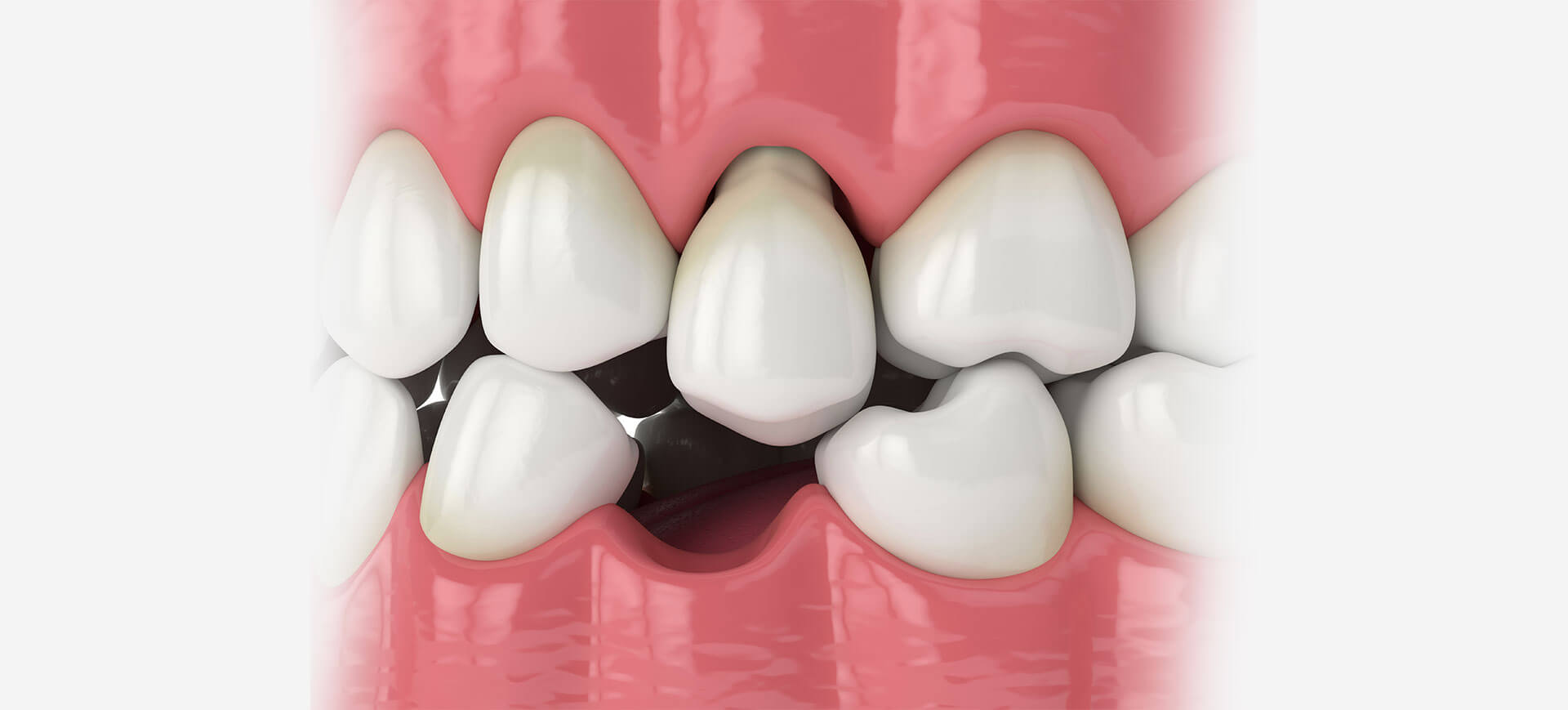So I’ve recently received a funny meme from a long time patient. This was apparently playing at an American dental clinic, it has since been re-posted on reddit and has become viral.
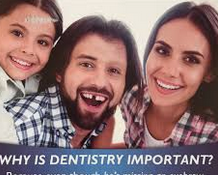
We all notice the missing front teeth, whilst not noticing the missing eyebrows.
Yes. our teeth is pretty important for our image, our beauty and our confidence. However if you’re someone who cares more about function and health. Our back teeth are just as important if not more! Heck in the long term, even if you only care about the front teeth, back teeth are still more important (because back teeth protect the front).
Every day I hear this at the office “Oh that’s fine, its only a back tooth” or “lucky its not my front tooth that’s got the problem”.
I feel obligated to do some patient education (If you’ve seen me in the office, you know how much passion I have to share knowledge, maybe I should have been a school teacher in another life).
Now, if you like it nice and short here is the TLDR:
- We have multiple pairs and layers of muscles to close our jaw, which can produce tremendous forces.
- The dentine layer on the inside of the tooth is slightly springy.
- Most of our teeth have just 1 root, including most premolars
- Our back teeth have 2-4 roots (teeth with 2 roots, are more like 4 roots, with 2 of them fused, they are big and wide) giving a “tri” pod effect
- Back teeth hit first, taking the brunt of the force, sparing the front teeth.
- Back teeth also limit side to side forces, which also eventually cause vertical cracks in the front teeth.
- Missing back teeth, means fillings on front teeth don’t last as long, more frequent chips and breaks, and gradual shortening of the teeth due to teeth wear.
If you are interested and want to know the details, venture below.
!!!Force overload!!!
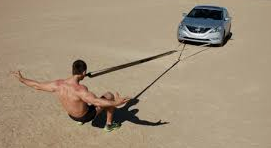
We have all seen pictures or scenes like this right? Amazing grip strength produced by our teeth and jaws.
What about a more down to earth daily example? Got that bottle you can’t open or want to fold over that piece of paper that 8th fold? Naturally we use our teeth and jaw muscles to aid us when our other muscles fail. *bad idea for tooth health!*
Take 1 thick rubber band, and wrap it around your hands, yeah, it has some force, but it’s not that hard to stretch the rubber bands right?
What if we took 3-4 rubber bands? All of a sudden its alot harder, and what if we also made the rubber bands thicker, so that they are more like rubber straps? Essentially that’s whats power our immensely strong jaws. multiple long sheaths of muscles wrapped over each other. When we bite together we are able to crush what ever we need to eat down to pieces, and our teeth definitely take a beating!
Shock Absorbers
That kinda sums up what our back teeth do for this section. If you stop to consider how soft our teeth are, its absolutely amazing.
Sure everyone knows that enamel is like the hardest object in our body. However its only ranks a 5 on the Mohs hardness scale. That screen on your phone is a 9, and most “weak” dental materials are actually much harder than our enamel, and those don’t even last that long, way shorter than how long our enamel can last.
As it turns out, biology really is amazing on what it can produce. As there is an intricate system in place which allows these soft and weak teeth, to last us a life time. (Its quite surprising to friends that are not in the profession when I tell them how many patients I have in their 90’s whom still have most of their teeth).
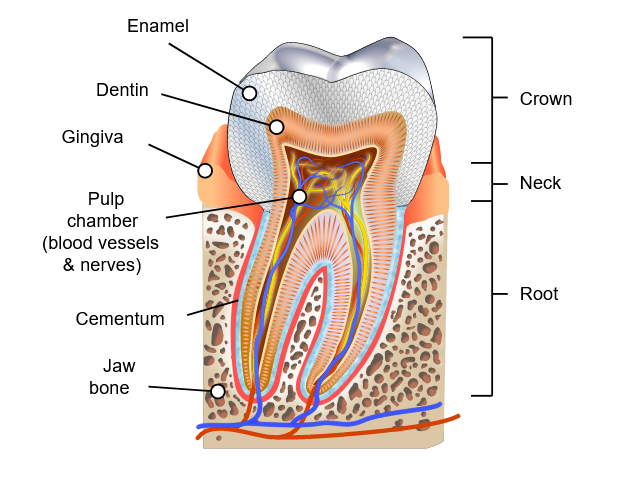
So, I’m sure everyone’s seen a cross section of a tooth by now.
- Enamel – hard outer layer coating our teeth
- Dentine – softer inner layer between the enamel and our “nerves”
- Dental pulp complex – actually a mixture of both blood vessels AND nerve
The above is also most likely common knowledge, if you wish to read further, of course we could get technical, however here’s some properties of teeth which are relevant here in easy to understand format.
Enamel
- Its actually fairly similar in terms of thickness, covering all of our teeth, despite the incisors being much smaller than the molars. Yes, there is a difference, however it is not that proportional to their size.
- its 99% mineral, and around 1% organic. Imagine tons of thick white chalk rods, wrapped in a thin layer of plastic. Bunch them all up together, and that’s similar to how enamel is microscopically.
- The rods have a direction when they were growing, and the directional structure remains forever.
- Whilst the enamel is quite hard, it is very brittle
- Dentine is much softer than enamel, however its much more flexible and gives the enamel a “cushioning” effect.
- They also have a direction
- Imagine their internal structure akin to a whole bunch of MacDonald straws, bunched up together tightly. if you push down on them at the right direction, they are very strong, maybe even able to take your body weight. However squash them on their side, and they are pretty useless.
- *Fun fact* they are much softer, and thus wears away faster – the significance of that we can discuss in a future blog
The fact that the layer of enamel covering our teeth is fairly consistent in thickness, means that the biggest variance between a back tooth and a front tooth, isn’t how thick the enamel is, but how much dentine there is on the inside.
Easy real life proof is to take a torch and shine it at your teeth, if you look in the mirror you’ll notice that the front teeth are pretty translucent. This is because its almost all enamel, with a much thinner dentine core.
Now more dentine in the back tooth, means more of that shock absorbing goodness, the enamel is much less likely to crack and break.
The back teeth also have more roots, which means the pressure of the bite gets spread out over a bigger area, and the tooth has a bit of a tri-pod effect.
What about their position in the mouth?
Heres a quick image with a pair of scissors,
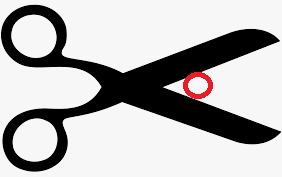
If you have something difficult to cut through, you put it towards the pivot point of the scissors, that’s where you get the most mechanical advantage and the most amount of force.
Our Jaw is kind of similar, with our back teeth being the closest point to our pivit, the TMJ or jaw joint. because they hit first, and they hit hard, taking the force of the bite, our front teeth can gently tap together without taking much damage.
(Side rant* from a purely engineering point of view our jaw is technically a class 2 or class 3 lever, for the back teeth, a nutcracker is a closer analogy, and the pivot point should be called a fulcrum, however, who likes jargon right?)
Our teeth, a house made of straws
Biology is really efficient, beautiful and full of life hacks and cheats.
Whilst its not easy to make something strong in all axis and directions, turns out its pretty easy to make things strong in one.
Our back teeth can take vertical stresses pretty well, and they can take a beating. However remember that our teeth are not flat either. They have these “mountains” on them we call cusps.
These cusps actually fit together, and lock, what this means is that if you bite together you will have a hard time grinding left to right (assuming you don’t need braces and you have a normal bite, its another reason to keep things nice and straight!).
Your front teeth, actually also lock, a good bite means your upper teeth up to your canines cover the bottom teeth, stopping us from grinding front to back.
This is the concept of Protected Bite (Mutually Protected Occlusion for the nerdy). Basically, our teeth actually work together to be stronger as a group!
Remember the straw analogy earlier? We are constantly having these devastating cracks down our back teeth, as well as right down the front of our front teeth. This is what a protected bite is trying to protect us from.
Front teeth, if you bite down and rub it side to side, will split down the middle (which is why nail biting is so devastating), Whist without our canines and front teeth, if we could rub our back molars in a front to back movement (imagine shoving out your jaw whilst clenching) we would crack our back teeth as well.
So in short, the back teeth prevent movement of the jaw whilst biting down in ways which would damage our front teeth, and our front teeth also protect our back teeth by also restricting the way our jaw can move whilst biting.
Bigger Brake Pads!
The larger back teeth, hit first, but they are also bigger in surface area. So when we bite together, they wear down first, before our front teeth gets worn shorter. Whilst this is not always intuitive it does make sense.
Take the scissors example. if you close the back of that angle by 1mm, how much does the tip of the scissors travel? Alot more right? In the same way, we can often lose 2-3mms of teeth height in the front, whilst only grinding away 1mm or less of teeth at the back!
If we are missing it to begin with, then all the more wear and tear on the front!
Moving teeth – not so easy to understand!
Everyone already knows that if you are missing a back tooth, things move around.
In more detail, the top teeth move into the gap of the bottom teeth. and generally teeth behind the gap, will tilt forwards.
What if you’re missing back teeth?
Well, you could replace it in a number of ways, bridges if it is suitable, but nowdays, more often than not we replace your teeth with dental implants.
Dental implants surgery and the restoration is what we do and what we are good at. Visit our clinic for dental implants in Brisbane.
With our own surgery set up, 3D CBVT scanner, you don’t have to travel away for your 3D x-ray scans or go away for your implant surgery.
Keep in mind, that whilst back teeth are important, on the general priority list of things to do. Its must more important to keep up to date with your general check up, cleans and staying decay free. However, don’t put it off for ever either!

